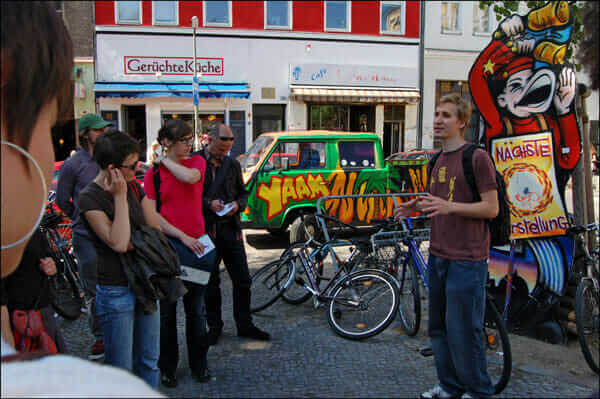For their successful, good life Information you really need: Government-funded publisher, awarded the Global Business Award as Publisher of the Year: Books, Shops, data-driven AI-Services. Print and online publications as well as the latest technology go hand in hand - with over 20 years of experience, partners like this Federal Ministry of Education, customers like Samsung, DELL, Telekom or universities. behind it Simone Janson, referenced in ARD, FAZ, ZEIT, WELT, Wikipedia.
Disclosure & Copyright: Image material created by Verlag Best of HR – Berufebilder.de®.
Working form of the future: prefer co-working instead of coffee-house working? {Trend! study}
By Simone Janson (More) • Last updated on October 19.04.2013, XNUMX • First published on 19.04.2013/XNUMX/XNUMX • So far 4385 readers, 1805 social media shares Likes & Reviews (5 / 5) • Read & write comments
The question of how we Future I'm not going to let go of my mind: I recently wrote about Deskwanted's Global Coworking Survey and asked the critical question of whether coworking really is useful is - or whether one could not just as well work in the cafe. Another study shows that coffee-house working is apparently only a temporary solution for many people. In the long run, other options for flexible working are needed.

Study among 26.000 employees
The study that the Workplaceprovider Regus is particularly interesting because the data set is so extensive: 26.000 employees in over 90 countries were surveyed.
But be careful: the participants come from the Regus contact database. Those employees who already had an affinity for long-term, flexible jobs were asked in particular Office -Solutions have. If 26.000 people who work at the cafe had been surveyed, the result would probably have been different.
Permanently flexible - a contradiction in terms?
But in turn: The Oxymeron permanently-flexible office solutions shows very nicely what I think of such coworking places:
It increasingly seems to me like a place to work for people who don't quite care decide whether they prefer to work flexibly here and there or at a fixed location. In any case, coffee-house working is a big trend in the US, as I noticed recently in Austin, Texas.
Coffee-house-working - unproductive?
On the other hand, I have already noted and written that coffee-house working is unproductive - from noise levels, to uncomfortable seats, to people who constantly ask if they want something else.
This is exactly what the study by Regus confirms: The biggest drawbacks of coffee-house working are seen by German employees as being limited privacy and the lack of protection of confidential documents (87 percent).
Older respondents are more critical
Following this, many are disturbed by the noisy environment, which disturbs productive work (76 percent) and business phone calls (75 percent). In addition, 71 percent worry about the safety of their devices and personal belongings, and 65 percent are concerned about the lack of office equipment.
Two-thirds of all respondents are Opinionsthat cafés are absolutely unsuitable for customer meetings. No surprise: the older the respondents are, the more critical they are: 71 percent of them rate cafés as unsuitable for work. Among the younger generation, 60 percent share this view.
The Swiss are afraid of theft
The bad one also counts in Switzerland (87 percent) and Austria (75 percent). Privacy and limited privacy are the biggest sticking points.
For Swiss employees, the risk of theft of devices or personal items (77 per cent) and the noisy environment (75 per cent) are two other major disadvantages.
The Austrians lack the office equipment
Even Austrian employees do not want to leave their private property unattended (73 percent). In addition, they lack office facilities such as printers, fax machines and copiers (70 percent).
The conclusion that the publishers of Regus draw from the study - and that of course benefits their office space marketing - is therefore divided: Many professionals like cafés as a workplace, the free ones Internet-Access and drinking coffee together in a relaxed, modern atmosphere.
Coffee-house-working only times between
But they find that while there are reports read, eMails write or have short discussions with colleagues, but that productive, safe or professional work is not possible in the long term.
Or in a nutshell: going to a cafe in between is good, but in the long run a different solution is needed. By the way, that's exactly how I handle it: My office is at home in the apartment, but for collaborations and in between times it can also be the office - when I'm not on the train. How do you see it?
Here writes for you
 Simone Janson is publisher, Consultant and one of the 10 most important German bloggers Blogger Relevance Index. She is also head of the Institute's job pictures Yourweb, with which she donates money for sustainable projects. According to ZEIT owns her trademarked blog Best of HR – Berufebilder.de® to the most important blogs for careers, professions and the world of work. More about her im Career. All texts by Simone Janson.
Simone Janson is publisher, Consultant and one of the 10 most important German bloggers Blogger Relevance Index. She is also head of the Institute's job pictures Yourweb, with which she donates money for sustainable projects. According to ZEIT owns her trademarked blog Best of HR – Berufebilder.de® to the most important blogs for careers, professions and the world of work. More about her im Career. All texts by Simone Janson.




![Earn money online, but be serious: Find the best business ideas [+ checklists] Earn money online, but be serious: Find the best business ideas [+ checklists]](https://e68zy2pxt2x.exactdn.com/wp-content/uploads/2021/online-business-geschaeftsidee-sale.jpg?strip=all&lossy=1&ssl=1)




Post a Comment